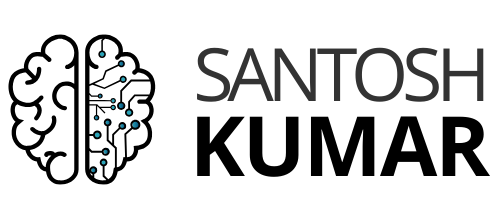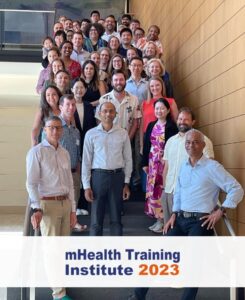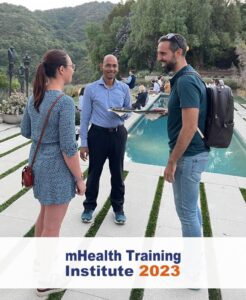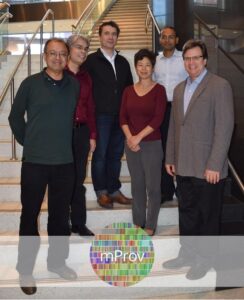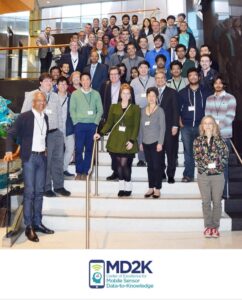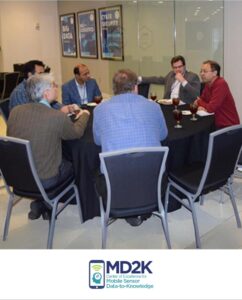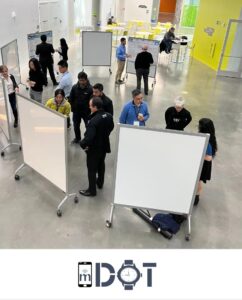Teaching & Presentations
- Home
- Teaching & Presentations
Teaching & Presentations
Dr. Kumar is not currently teaching any classes.
Previous Classes
• COMP 4270/6270: Introduction to Operating Systems (Spring 2014, 2013, 2012, 2011, 2010, 2009, 2008, 2007)
• COMP 7313: Network Design and Performance Analysis (Fall 2009, 2008, 2007, 2006)
• COMP 3825: Networking and Information Assurance (Spring 2007)
Other Teaching & Presentation Activities
• mHealth Training Institute at UCLA: Organizing faculty, lecturer, and team mentor (2024, 2023, 2022, 2021, 2020, 2019, 2018, 2017, 2016, 2015, 2014)
• MD2K Webinars:
• Mobile Health Analytics: Addressing Disparities in the Southern United States (2016)
• puffMarker: A Multi-Sensor Approach for Pinpointing the Timing of First Lapse in Smoking Cessation (2016)
Talks & Presentations
“” NSF Workshop on Crosscutting Research Needs for Digital Twins, 11/12/23.
“Closing the Loop Using Imperfect mHealth Digital Biomarkers of Mental Health,” IEEE BHI Special Session on Enabling Closed-Loop Technologies for Mental Health: Biobehavioral Sensor Informatics and Just-in-Time Interventions, 10/15/23.
“Wearable AI for Discovery, Optimization, and Deployment of Just-in-Time mHealth Interventions,” Keynote Speech, Research & Engagement Day, Kennesaw State University, 04/13/23.
“AI Modeling Challenges in Detecting Self-Reported States from Wearables,” UCLA Depression Grand Challenge, 03/31/23.
“Stress Monitoring and Intervention Using Wearables,” National Association of Science Writers Conference, 10/23/22.
“mHealth Risk Estimation from Wearable AI for Smoking Cessation,” NSF-NIH Smart Health and Biomedical Research in the Era of Artificial Intelligence and Advanced Data Science Workshop, 10/6/22.
“Challenges and Opportunities in Trustworthy AI for Health and Wellness” ACM SIGKDD Trustworthy AI Day, 08/15/22.
“Detecting and Characterizing Stress in Daily Life,” Keynote Speech at IEEE EMBC Workshop on Detection of Stress and Mental Health Using Wearable Sensors, 07/11/2022.
“Can Sharing Anonymous Wrist-worn Accelerometry Data Re-identify You,” EECS Department, University of California, Irvine, 06/03/2022.
“Can Sharing Anonymous Wrist-worn Accelerometry Data Re-identify You,” CSE Department, The Ohio State University, 04/29/2022.
“Persuasive AI to Improve Health and Wellness,” Indo-US Roundtable, 03/24/2022.
“Wearable AI for Designing, Optimizing, and Delivering Temporally-Precise mHealth Interventions,” mHealth Special Session at International Conference on Network, Systems, and Security (NSySs’21), 12/23/2021.
“Discovery, Optimization, and Translation of Temporally-Precise mHealth Interventions,” IEEE Digital Health Panel, 9/7/2021 (Host: Iqbal Ahamed)
“Synergistic Collaboration Among Computing and Health Researchers,” NIH Annual mHealth Training Institute, UCLA, 7/30/2021.
“From Sensed Data to Digital Biomarkers – Lessons Learned,” NIH Annual mHealth Training Institute, UCLA, 5/24/2021.
“Breakout Session on Real-time Multimodal Data”, NSF-NIH Workshop on Establishing the Roadmap for Security, Privacy, and Ethics Research in Health, 5/14/21, 5/28/2021, and 6/11/2021.
“Experiences in Developing and Deploying ML Models from Wearables,” Cyber Physical Health Systems Panel in IEEE CPS-IoT Week, 5/18/2021.
“AI-Enabled Precision Healthcare via Wearable or Sharable Devices,” Community Health and Preventive Care Panel, Vaibhav Summit, Government of India, 10/24/2020.
“AI-Enabled Wearable Devices,” Integration of AI in Medical Devices, Vaibhav Summit, Government of India, 10/24/2020.
“Identifying Location Micro-Patterns Conducive to Smoking from GPS and Activity Traces,” NIH Workshop on Harnessing Novel Data Sources and Technologies for the Study of Social Determinants of Health (SDOH) in Heart, Lung, Blood, and Sleep (HLBS) Disorders, 09/29/2020.
“Sensitivity, Specificity, Generalizability, and Reusability Aspirations for Machine Learning (ML) Models in mHealth,” Keynote Speech, International Workshop on Deep Learning for Wellness Applications Leveraging Mobile Devices and Edge Computing (HealthDL) at ACM MobiSys, 6/16/2020.
Panel on “Future Trends of Edge of Cloud-Assisted Mobile Healthcare,” HealthDL Workshop at ACM MobiSys, 6/16/2020.
“mContain: An App for Personal Tracking of Social Distancing,” mPOWER meeting of NSF, NIH, and NIST program officers, 5/28/2020.
“Collection, Modeling, and Interpretation of Mobile Sensor Big Data,” IEEE Conference on Point of Care Technology (IEEE-POCT), NIH, Bethesda, 11/21/2019.
“MD2K Platforms for Computational Modeling of Health and Behavior from Wearable Sensor Data,” Generation AI Conference, CIFAR, Toronto, 10/15/2019.
“Building Computational Models to Infer Health and Behavior from Wearable Sensor Data,” 3M Corporation, Minneapolis, 10/11/2019.
“Collecting Emerging mHealth Biomarkers from Daily Life to Assess CVD Risk,” CARDIA Steering Committee, NHLBI Cohort from NIH, 2/12/2019.
“Towards Sensor-assisted Stress Management,” Cognitive Science Seminar, University of Memphis, 10/31/2018.
“Mobile Sensor Big Data Software Platforms from MD2K,” mHealth Tech Showcase, NIH, 06/04/2018.
“Temporally Dense Biomarkers of Daily Behaviors from Mobile Sensors,” Brain Behavior Meeting by OBSSR, NIH, 04/08/2018.
“A Historical Perspective on the Evolution of MD2K Center of Excellence,” Grant Writing Course (in College of Education), University of Memphis, 1/24/2018.
“Dynamic Patient Re-stratification Using Mobile Sensors,” Keynote Speech at Dagstuhl Seminar on Computational Challenges in Personalized Medicine, Dagstuhl, Germany, 11/20/2017.
“Mobile Sensor Big Data Challenges in Health, Wellness, and Productivity,” University of Utah, 11/06/2017.
“Mobile Sensor Big Data Challenges in Monitoring and Improving Health, Wellness, and Performance,” Keynote Speech at Affective Computing and Intelligent Interaction Workshop on Mental Health and Wellbeing, Pain, and Distress, 10/23/2017.
“Mobile Sensor Big Data Challenges in Monitoring and Improving Health, Wellness, and Performance,” University of Iowa, 09/28/2017.
“Collecting High-frequency Mobile Sensor Data for Long-lasting Research Utility,” Science of Behavior Change Program (SOBC), NIH, 09/25/2017.
“Utility of Collecting High-frequency Mobile Sensor Data in Health Research,” Steering Committee meeting of the Multi-ethnic Study of Atherosclerosis (MESA), NHLBI, NIH, 9/08/2017.
“Mobile Sensor Data-to-Knowledge (MD2K): Lessons Learned on Data Collection, Modeling, and Validation,” Health Data Exploration Summer Institute (HDESI), UC San Diego, 7/19/2017.
“Using Mobile Sensors to Self-Monitor and Improve Health, Wellness, and Performance,” Keynote Speech at ACM MobiSys Workshop on Wearable Systems and Applications (WearSys), 6/19/2017.
“Emerging Research Challenges – A Perspective from MD2K Center of Excellence,” BDSouthHUB Workshop on Mobile Health, 5/15/2017.
“How Big Data on Your Body Can Improve Your Health, Wellness, and Performance,” Plenary Lecture at the National Conference on Undergraduate Research, 4/7/2017.
“Center of Excellence for Mobile Sensor Data-to-Knowledge (MD2K),” Center for Drug Use and HIV Research, New York University, 4/4/2017.
“Individualized Mobile Health and Real-life Biosensor Technology within the CTN,” Annual Meeting of NIDA Clinical Trials Network, 3/24/2017.
“Biobank for mHealth: Collecting High-frequency Mobile Sensor Data for Long-lasting Research Utility,” OBSSR Director’s Seminar Series, 11/15/2016.
“Promise and Potential of Mobile Sensor Data-to-Knowledge (MD2K),” BDSouthHUB (NSF), 11/3/2016. “Promise and Potential of Mobile Sensor Data-to-Knowledge (MD2K),” Biological Sciences, University of Memphis, 10/20/2016.
“Center of Excellence for Mobile Sensor Data-to-Knowledge (MD2K),” SIM Strategy Series Executive Conference, 9/28/2016.
“Center of Excellence for Mobile Sensor Data-to-Knowledge (MD2K),” University of Memphis General Faculty Meeting, 8/18/2016.
“Development and Validation of Biomarkers from Mobile Sensor Data,” Health Data Exploration Institute, UC San Diego, 07/12/2016.
“Biomarkers of Health Behaviors from Wearable Wireless Sensors,” mHealth Training Institute, UCLA, 08/09/2016.
“Promise and Potential of Mobile Sensor Data-to-Knowledge (MD2K),” Florida Atlantic University, 5/19/2016.
“Center of Excellence for Mobile Sensor Data-to-Knowledge (MD2K),” Memphis Area Psychological Association, 12/10/2015.
“Center of Excellence for Mobile Sensor Data-to-Knowledge (MD2K),” Health Journal Club, College of Business, University of Memphis, 10/28/2015.
“Perils and Promise of mHealth Big Data,” Scripps Translational Science Institute Conference on Evidence Driven mHealth, 10/2/2015.
“Center of Excellence for Mobile Sensor Data-to-Knowledge (MD2K),” Mayo Clinic Individualized Medicine Conference, 9/23/2015.
“Mobile Sensor Big Data Challenges in Realizing Precision Medicine,” Microsoft Corporation, 9/1/2015.
“Incorporating Mobile Exposure in mHealth Precision Medicine,” NIEHS Exposome Webinar Series, 8/4/2015.
“Mobile Health (mHealth) Platforms for the Era of Precision Medicine,” Intel Corporation, 6/30/2015.
“A Computer Scientist’s Journey in mHealth,” Keynote Speech, Smart and Connected Health Aspiring PI Meeting, National Science Foundation (NSF), 6/29/2015.
“Towards Sensor-triggered Mobile Health Interventions,” Keynote Speech, Annual Meeting of the Society for Ambulatory Assessment, 6/26/2015.
“Sensor-triggered Just-in-time (JIT) Mobile Health Interventions – A Transdisciplinary Research Opportunity,” OBSSR 20th Anniversary Celebrations, NIH, 6/25/2015.
“Detecting Cocaine Use from Wireless ECG Worn in Field Studies,” NIDA Webinar, 5/21/2015.
“Improving the Temporal Precision of Precision Medicine via Mobile Health,” iDASH Webinar, UC San Diego, 5/15/2015.
“Improving the Temporal Precision of Precision Medicine via Mobile Health,” St. Jude’s Children Research Hospital, 5/4/2015.
“Is the User Ready to Receive A Sensor-triggered Just-in-time Mobile Health Intervention?,” Annual Meeting of the Society for Behavioral Medicine (SBM), 4/24/2015.
“Continuous Measurement of Stress – What Makes Driving Stressful?,” Annual Meeting of the Society for Behavioral Medicine (SBM), 4/23/2015.
“Designing Sensor-triggered Just-in-time Mobile Health Interventions,” Wayne State University, 4/21/2015.
“Addressing Addictive Behaviors Using Sensor-Triggered Just-in-Time Mobile Health Interventions,” Keynote Speech, NIDA Clinical Trials Network, Gaithersburg (MD), 4/16/2015.
“Designing Sensor-Triggered Just-in-Time Interventions,” Keynote Speech, 14th Annual UT/KBRIN Bioinformatics Summit, Buchanan (TN), 3/21/2015.
“Measuring Stress & Addictive Behaviors Using Mobile Physiological Sensors,” ENAR Meeting, Miami, 3/16/2015.
“Testing the Devices: Using the Cohort to Assess Efficacy,” NIH Precision Medicine Workshop, NIH Campus, 2/12/2015.
“Sensor Triggered Just-in-Time Mobile Health Interventions – Opportunities & Challenges,” Dartmouth College, January 2015.
“Computing Grand Challenges in Future Mobile Health Systems and Applications – Introduction & Chair’s Address,” NIH Campus, October 2014.
“mHealth – Cardiovascular Health Scenarios,” ACM SIGKDD Workshop on Bigdata Opportunities & Challenges in Mobile Health, New York City, August 2014.
“Cyber Physical Systems Models for Just-in-Time Care Delivery with Mobile Health Sensors,” Mini-symposium #19, 36th Annual International Conference of the IEEE Engineering in Medicine and Biology Society (EMBC), Chicago, August 2014.
“Inferring Stress and Addictive Behaviors Using Mobile Sensors,” Mini-symposium #41, 36th Annual International Conference of the IEEE Engineering in Medicine and Biology Society (EMBC), Chicago, August 2014.
“Continuous Measurement of Stress in the Mobile Environment via Wireless Physiological Sensors,” NIH Annual Meeting of the Science of Behavior Change (SOBC), June 2014.
“State-of-the-Science in Mobile Health,” American Association for Advancement in Science (AAAS) Workshop on mHealth and Law, June 2014.
“Predicting Smoking Abstinence via Mobile Monitoring of Stress and Social Context,” NIH OppNet Sleep & Stress Meeting, May 2014.
“Computational Modeling of Human Behaviors from Mobile Sensors,” Marquette University, April 2014.
“Computational Modeling for Automated Detection of Cocaine Use from ECG Response,” Annual Meeting of the Society for Behavioral Medicine (SBM), Panel#16, Philadelphia, PA, April 2014.
“Identifying Drug (Cocaine) Intake Events from Acute Physiological Response in the Presence of Free-living Physical Activity,” ACM IPSN, Berlin, Germany, April 2014.
“Realizing the Vision of P5 Medicine via Mobile Health – Application to Cardiac Care,” UCLA mHealth Symposium, jointly organized by UCLA Medical School, CTSI, and Bioengineering, March 2014.
“Computational Modeling of Behaviors from Mobile Sensors: A Case Study of Modeling Cocaine Use Response in ECG,” NIDA Intramural Research Program, NIH, Feb 2014.
“Behavior Assessment with Mobile Sensors,” NIH mHealth Training Institute, mHealth Summit, Dec 2013.
“Computational Modeling of Behaviors from Mobile Measurement of Physiology,” Duke Medical School, Dec 2013.
“Computational Modeling of Behaviors from Mobile Measurement of Physiology,” Distinguished Lecture Series, Computer Science & Engineering, UC San Diego, Dec 2013.
“Understanding Data Yield in Mobile Health User Studies with Wearable Sensors,” The Ohio State University, Oct 11, 2013.
“Assessment of Behavioral Health with Physiological Sensors,” Mobile Data Repository and Analysis Platforms, iDASH Meeting, UC San Diego. Sep 2013.
“Just-in-Time mHealth Intervention with Physiological Sensors,” First International Symposium on Computational Behavioral Science, Kanagawa, Japan. Sep 2013.
“The Future of Health IT for Behavioral Health – Biosensors,” White House Speech at the Technology Innovations for Substance Abuse and Mental Health Treatment Conference. Sep 2013.
“Realizing Just-in-time mHealth Intervention via Mobile Assessment of Health, Behavior and Context – Opportunities and Challenges,” Keynote Speech at the 6th Scientific Meeting of the International Society for Research on Internet Interventions (ISRII), May 2013.
“Revolutionizing Healthcare via Democratization of Mobile Health – An Agenda for Computing Research,” University of Texas, Arlington, Feb 2013.
“Revolutionizing Healthcare via Democratization of Mobile Health – An Agenda for Computing Research,” Washington University in St. Louis, Feb 2013.
“Mobile Measurement of Behavioral and Social Health at Population Scale – Implications for Computing Research,” Keynote Speech at the 10th IEEE/IFIP International Conference on Embedded and Ubiquitous Computing and 15th IEEE International Conference on Computational Science and Engineering, Paphos, Cyprus, 12/5/2012.
“Measurement of Behavioral and Social Health at Population Scale,” Auburn University, 9/30/2012.
“Measurement of Behavioral and Social Health at Population Scale,” University of Illinois at Urbana Champaign (UIUC), 9/13/2012.
“Measurement of Behavioral and Social Health at Population Scale,” Dartmouth College, 05/23/2012.
“Measurement of Behavioral and Social Health at Population Scale,” mHealth Extravaganza Lecture Series, National Institutes of Health (NIH), 05/03/2012.
“mPuff: Automated Detection of Cigarette Smoking Puffs from Respiration Measurements,” ACM/IEEE IPSN Conference, Beijing, China, 04/19/2012.
“Mobile Measurement of Behavioral and Social Health at Population Scale – Implications for Computing Research,” Keynote Speech at the 2nd Mobile Sensing Workshop, IEEE/ACM Information Processing in Sensor Networks (IPSN) Conference, Beijing, China, 04/16/2012.
“Automated Assessment of Naturally Occurring Conversations,” Symposium 17: Device-Enabled Measurement of Health Behaviors in Real-time (SY17), Annual Meeting of Society for Behavioral Medicine (SBM), New Orleans, 04/12/2012.
“Measurement of Behavioral and Social Health at Population Scale,” Electrical Engineering and Computer Engineering, 03/20/2012.
“Measurement of Behavioral and Social Health at Population Scale,” Georgia Institute of Technology, 03/07/2012.
“Measurement of Behavioral and Social Health at Population Scale,” Biomedical Engineering, 01/27/2012.
“Measurement of Behavioral and Social Health at Population Scale,” NSF Workshop on Measuring Population Health, Washington, D.C., 01/12/2012.
“mHealth Evidence Workshop: Evaluating the Efficacy and Safety of Mobile Health,” mHealth Summit, Washington, D.C., 12/06/2011.
“Addressing Stress and Addictive Behavior in the Natural Environment Using AutoSense,” University of California, Los Angeles, 11/4/2011.
“Addressing Stress and Addictive Behavior in the Natural Environment Using AutoSense,” University of Washington, 10/31/2011.
“Addressing Stress and Addictive Behavior in the Natural Environment Using AutoSense,” University of California, San Diego, 10/11/2011.
“Addressing Stress and Addictive Behavior in the Natural Environment Using AutoSense,” University of Pennsylvania, 10/19/2011.
“Addressing Stress and Addictive Behavior in the Natural Environment Using AutoSense,” Washington University in St. Louis, 09/30/2011.
“mHealth Evidence Workshop – Exploring Innovative Methods to Evaluate Efficacy and Safety of Mobile Health,” Chair’s Address, mHealth Evidence Workshop, Washington D.C., 8/16/2011.
“Addressing Stress and Addictive Behavior in the Natural Environment Using AutoSense,” Duke University, 04/13/2011.
“Scaling Personal Stress Assistance in Natural Environment,” National Science Foundation Workshop on Pervasive Computing at Scale, Seattle, WA, 1/27/2011.
“Addressing Stress and Addictive Behavior in the Natural Environment Using AutoSense,” The Ohio state University, 10/28/2010.
“Integration of novel methods to assess effects of stress and alcohol use,” Annual Meeting of the Society for Prevention Research (SPR), Denver, CO, June 2010.
“Integration of novel methods to assess effects of stress and alcohol use,” Annual Convention of the American Psychosomatic Society Meeting, Portland, OR, March 2010.
“AutoSense: A Wireless Sensor System to Quantify Psychosocial Stress and Alcohol in Natural Environments,” New Frontiers in Measurement: Phenotypes, Endophenotypes, and Envirotypes for Genetic and Behavioral Studies of Nicotine Dependence, at the Annual Conference of the Society for Research on Nicotine and Tobacco (SRNT), Feb 2010.
“AutoSense: A Wireless Sensor System to Quantify Personal Exposures to Psychosocial Stress and Alcohol in Natural Environments,” International Society for Exposure Sciences (ISES), Minneapolis, MN, 11/05/2009.
“Stress and Addiction: Integration of Novel Assessment Methods,” within the Symposium titled ‘GeneEnvironment Interplay in Stress and Health: Network on Exposure to Psychosocial Stress and Addictive Substances’, Annual Convention of the Association for Psychological Sciences. San Francisco, CA, 05/22/2009.
“Enabling Physical, Emotional, and Social Well-Being Through Personalized Sensing in Natural Environments,” National Science Foundation Workshop on Future Directions in Networked Sensing: Fundamentals and Applications, Arlington, VA, 11/12/2009.
“Wireless Sensor Networks: A New Revolution in Computing Coming Your Way,” National Institute of Technology, Jamshedpur, India, 5/26/2009.
“Trap Coverage: Allowing Coverage Holed of Bounded Diameter in Wireless Sensor Networks,” IEEE INFOCOM, Rio De Janeiro, Brazil, 04/21/2009.
“Random vs. Deterministic Deployment of Sensors in the Presence of Failures and Placement Errors,” IEEE INFOCOM, Rio De Janeiro, Brazil, 04/20/2009.
“AutoSense: A Wireless Sensor System to Quantify Psychosocial Stress and Alcohol in Natural Environments,” National Institute on Alcohol Abuse and Alcoholosim (NIAAA), National Institutes of Health (NIH), 1/12/2009.
“Coverage and Connectivity in Wireless Networks: the Journey from Percolation to Reliable Density Estimates”, First Workshop on the Theory of Ad-Hoc and Sensor Networks (ThASN) (in conjunction with IEEE MASS conference), 9/29/2008.
“Optimal Sleep Wakeup Algorithms for Barriers of Wireless Sensors,” Invited (live video) Lecture to a joint course of Ohio State University and University of Cincinnati, 10/15/2007.
“Coverage and Connectivity in Wireless Networks: the Journey from Percolation to Reliable Density Estimates”, Clemson University, 11/9/2007.
“Coverage and Connectivity in Wireless Networks: the Journey from Percolation to Reliable Density Estimates”, Georgia Institute of Technology, 10/17/2007.
“Optimal Sleep Wakeup Algorithms for Barriers of Wireless Sensors,” IEEE BROADNETS, Raleigh, NC, 2007.
“Barrier Coverage With Wireless Sensors,” University of Memphis, 2/24/2006.
“On k-Coverage in a Mostly Sleeping Sensor Network,” ACM MobiCom, Philadelphia, PA, 2004.
Position History
- Lillian & Morrie Moss Chair of Excellence in Computer Science, University of Memphis (2015-present)
- Professor with Tenure – University of Memphis (2015-present)
- Associate Professor with Tenure – University of Memphis (2011-2015)
- Assistant Professor – University of Memphis (2006-2011)
- SBC Presidential Fellow – The Ohio State University (2006)
- Graduate Research & Teaching Associate – The Ohio State University (2000-2005)
Last updated: 6/10/24
